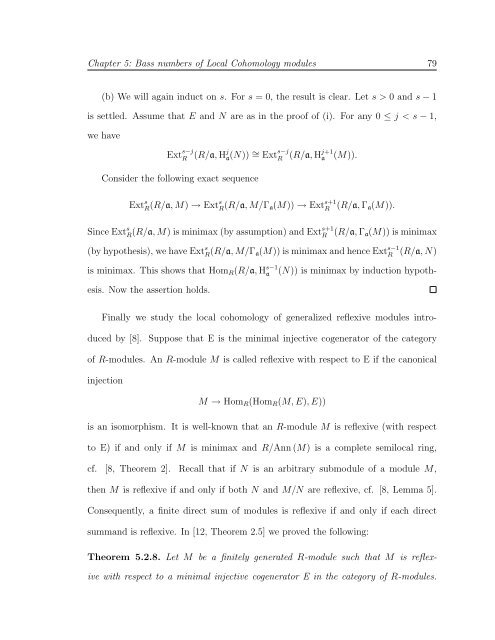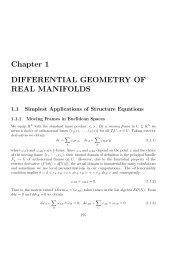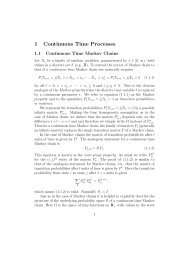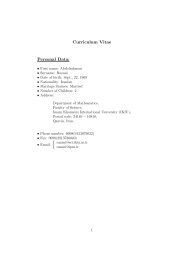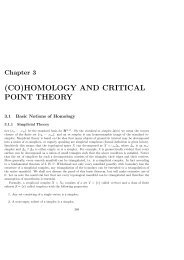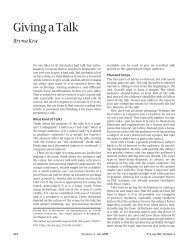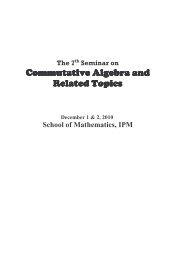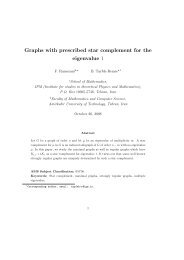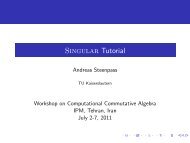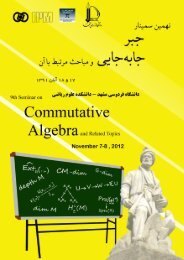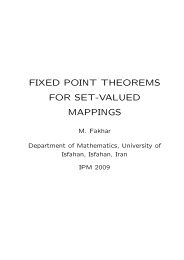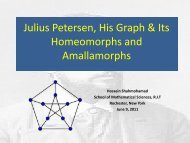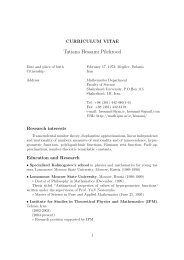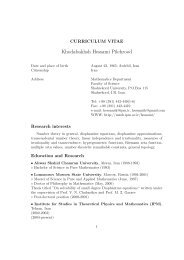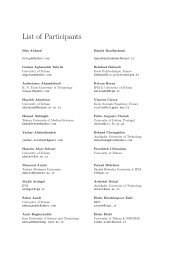Betti numbers of modules over Noetherian rings with ... - IPM
Betti numbers of modules over Noetherian rings with ... - IPM
Betti numbers of modules over Noetherian rings with ... - IPM
You also want an ePaper? Increase the reach of your titles
YUMPU automatically turns print PDFs into web optimized ePapers that Google loves.
Chapter 5: Bass <strong>numbers</strong> <strong>of</strong> Local Cohomology <strong>modules</strong> 79<br />
(b) We will again induct on s. For s = 0, the result is clear. Let s > 0 and s − 1<br />
is settled. Assume that E and N are as in the pro<strong>of</strong> <strong>of</strong> (i). For any 0 ≤ j < s − 1,<br />
we have<br />
Ext s−j<br />
R (R/a, Hj<br />
a(N)) ∼ = Ext s−j<br />
R<br />
Consider the following exact sequence<br />
(R/a, Hj+1<br />
a (M)).<br />
Ext s R(R/a, M) → Ext s R(R/a, M/Γa(M)) → Ext s+1<br />
R (R/a, Γa(M)).<br />
Since Ext s R(R/a, M) is minimax (by assumption) and Ext s+1<br />
R (R/a, Γa(M)) is minimax<br />
(by hypothesis), we have Ext s R(R/a, M/Γa(M)) is minimax and hence Ext s−1<br />
R (R/a, N)<br />
is minimax. This shows that HomR(R/a, H s−1<br />
a (N)) is minimax by induction hypoth-<br />
esis. Now the assertion holds.<br />
Finally we study the local cohomology <strong>of</strong> generalized reflexive <strong>modules</strong> intro-<br />
duced by [8]. Suppose that E is the minimal injective cogenerator <strong>of</strong> the category<br />
<strong>of</strong> R-<strong>modules</strong>. An R-module M is called reflexive <strong>with</strong> respect to E if the canonical<br />
injection<br />
M → HomR(HomR(M, E), E))<br />
is an isomorphism. It is well-known that an R-module M is reflexive (<strong>with</strong> respect<br />
to E) if and only if M is minimax and R/Ann (M) is a complete semilocal ring,<br />
cf. [8, Theorem 2]. Recall that if N is an arbitrary submodule <strong>of</strong> a module M,<br />
then M is reflexive if and only if both N and M/N are reflexive, cf. [8, Lemma 5].<br />
Consequently, a finite direct sum <strong>of</strong> <strong>modules</strong> is reflexive if and only if each direct<br />
summand is reflexive. In [12, Theorem 2.5] we proved the following:<br />
Theorem 5.2.8. Let M be a finitely generated R-module such that M is reflex-<br />
ive <strong>with</strong> respect to a minimal injective cogenerator E in the category <strong>of</strong> R-<strong>modules</strong>.


